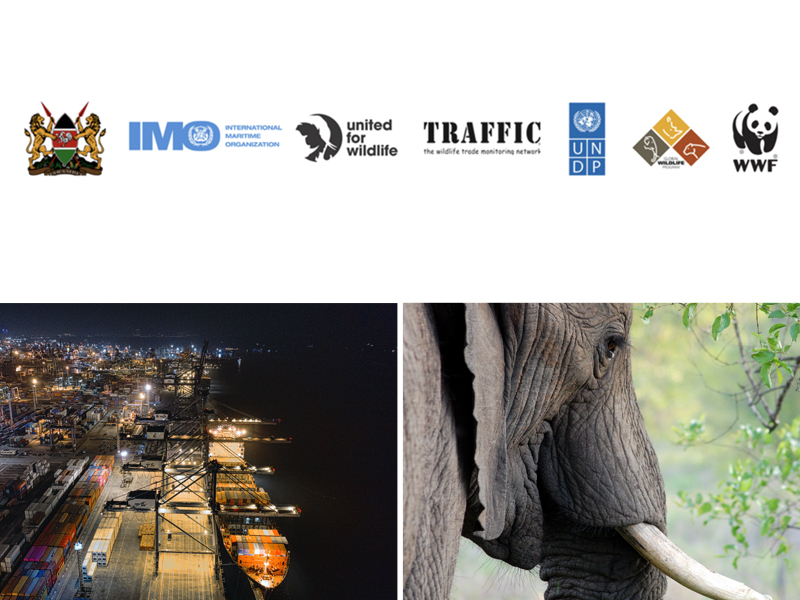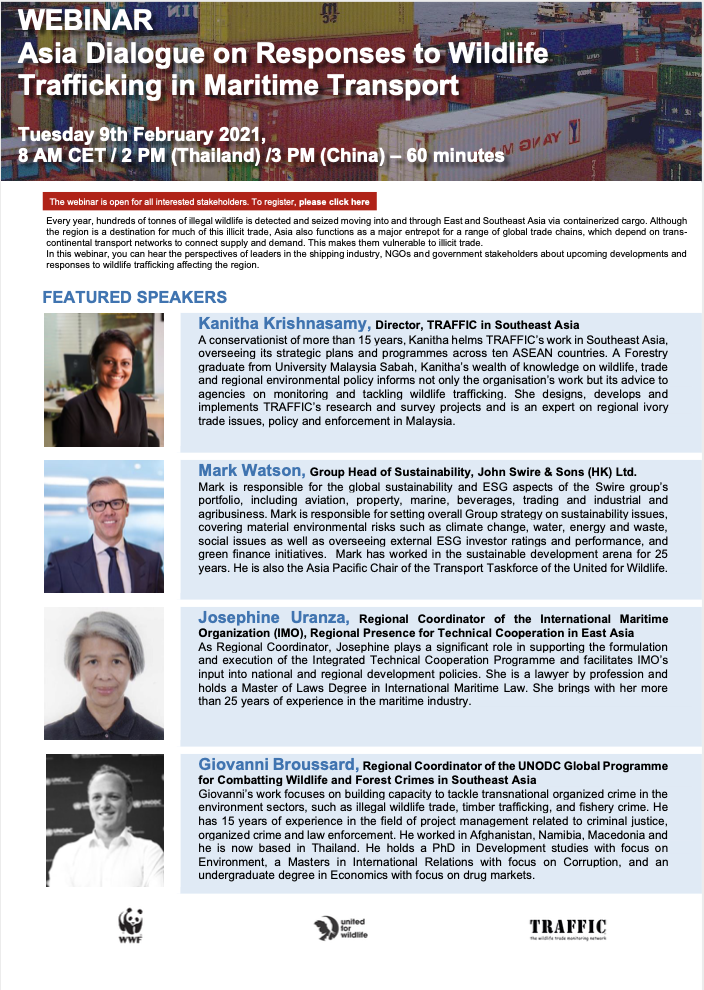Webinar - Accelerating action against wildlife trafficking in international maritime supply chains

A discussion on global wildlife trafficking through maritime transport supply chains as well as how governments, the IMO and the private sector can take action to combat this transnational organized crime.
Asia Dialogue on Responses to Wildlife Trafficking in Maritime Transport (9 February 2021)
Every year, hundreds of tonnes of illegal wildlife is detected and seized moving into and through East and Southeast Asia via containerized cargo. Although the region is a destination for much of this illicit trade, Asia also functions as a major entrepot for a range of global trade chains, which depend on trans- continental transport networks to connect supply and demand. This makes them vulnerable to illicit trade. In this webinar, you can hear the perspectives of leaders in the shipping industry, NGOs and government stakeholders about upcoming developments and responses to wildlife trafficking affecting the region.
Webinar registration: click here.
Time: 8am-9am CET
Speakers:
Kanitha Krishnasamy, Director, TRAFFIC in Southeast Asia
Mark Watson, Group Head of Sustainability, John Swire & Sons (HK) Ltd and Asia Pacific Chair of the United for Wildlife's Transport Taskforce
Josephine Uranza, Regional Coordinator of the International Maritime Organization (IMO), Regional Presence for Technical Cooperation in East Asia
Giovanni Broussard, Regional Coordinator, UNODC Global Programme for Combatting Wildlife and Forest Crimes in Southeast Asia
Event information flyer:
Solutions identified to address illegal wildlife trade (September 2020)

The global scale of wildlife trafficking and its devastating impacts across biodiversity, economic development, security and human health was at the core of a webinar to discuss efforts by governments and private sector to address this crime within maritime supply chains.
The illegal trade in wildlife is a truly global issue and no country is untouched by this form of crime. Wildlife that is illegally traded through containerized sea cargo typically involves large volumes of non-perishable wildlife products, such as pangolin scales, ivory, timber and shark fins. They are usually undeclared.
Participants highlighted the involvement of organized criminal groups in transporting large volumes of wildlife contraband at a single time. Corruption was also identified as a key problem.
Tackling against transnational criminal groups illegally trading in wildlife requires increased cooperation and information sharing between shipping lines, government agencies and the NGO community. Detecting this crime can also involve financial investigation - the so-called “following the money” approach.
The use of increased digitalization of shipping documents can also help in facilitating better screening of cargo documentation. Digitalization is also seen as a way to reduce corruption in the supply chain.
The Government of Kenya outlined the country’s proposal to IMO’s Facilitation Committee (which meets in remote session 28 September-2 October) to develop guidelines on the prevention and suppression of the smuggling of wildlife on ships engaged in international maritime traffic, Government representatives, shipping lines, IGOs and NGOs welcomed the proposal. Such guidelines could be developed through a consultative approach involving a broad group of stakeholders, including maritime authorities, shipping lines and wildlife experts
The event was organized by IMO with the United for Wildlife transport Taskforce (which brings together transport stakeholders along with law enforcement and other agencies), TRAFFIC (an NGO working to stop trade in wildlife), the United Nations Development Programme (UNDP), the World Bank-led Global Wildlife Program and World Wide Fund for Nature (WWF).
Watch the full webinar here.
Speakers
Introductory remarks
Kitack Lim Secretary General International Maritime Organization (IMO)
Moderator
Robert Campbell Programme Manager United for Wildlife Taskforces The Royal Foundation
Speakers
- Nancy Karigithu, Principal Secretary, State Department for Shipping and Maritime Ministry of Transport, Infrastructure, Housing, Urban Development and Public Works, Government of Kenya
- Steven Broad, Executive Director, TRAFFIC
-
Allan Jorgensen, Head of Sustainable Trade, Maersk
 Asia Dialogue event flyer.pdf
Asia Dialogue event flyer.pdf